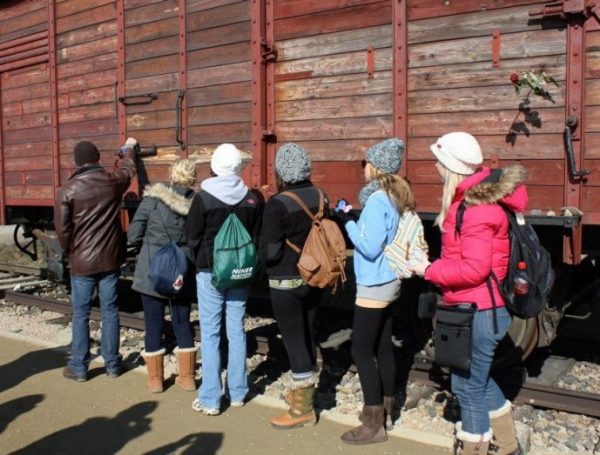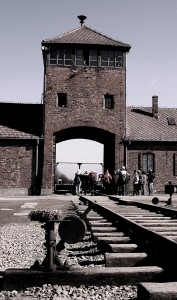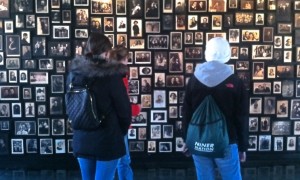Bearing Witness: Students Learn Lessons From the Holocaust

Atrocities can start with seemingly insignificant acts.
UNC Charlotte students have learned this painful, yet powerful lesson through their in-depth study of the Holocaust. As scholars in the course “Bearing Witness to the Past: A Journey to Auschwitz,” they have traveled to the death camps of Auschwitz and Krakow. They have studied the photographs of the dead and read their names. They have seen the mute mountains of surrendered belongings – the shoes, the battered suitcases, the eyeglasses.
“We can’t fathom that six million Jews, plus several million others, were tortured, shot, starved, gassed,” said student Liz Roberts. Yet, these students have gained a deeper understanding of what the raw numbers mean through the trip conceived, organized and led by Judy LaPietra, a part-time faculty member in the Department of Global, International & Area Studies (GIAS).
Personal connections breathe life into the statistics found in the research materials, as the course focuses not only on the history of the Holocaust but also on the history of the Jewish people and their oppressors.
“I believe that it is imperative that other cultures be studied, because education and knowledge are two of the best tools to combat genocide and human rights abuses,” Roberts said.
To prepare for the trip, students received access to a website created by the Shoah Foundation, which hosts thousands of testimonies from survivors of the Holocaust. Students were asked to complete projects on individual survivors.
 “The students learn about the individual lives of people who had loved ones, had homes and jobs and hobbies and dreams,” said John Cox, an associate professor in GIAS, which organizes the Auschwitz course and trip. Cox specializes in holocaust, genocide and human rights issues and administers a minor in those topics.
“The students learn about the individual lives of people who had loved ones, had homes and jobs and hobbies and dreams,” said John Cox, an associate professor in GIAS, which organizes the Auschwitz course and trip. Cox specializes in holocaust, genocide and human rights issues and administers a minor in those topics.
For Roberts, the research material provided an important first step towards understanding, although incomparable to traveling to the death camps. “The testimonies and video projects were amazing,” she said. “But they were only a tiny window into what I would see and how I would feel once I got there. I don’t think any activity, assignment, or course material can prepare you for the emotional impact of the camps.”
Cox and Judy LaPietra accompanied the students on the spring 2013 and 2014 study abroad trips; LaPietra led the most recent trip in March 2015. Throughout the trips, the professors reminded the students of the loss of individual lives and of the devastating impact on civilizations and cultures.
“We should feel indignation and compassion and avoid being academically removed,” Cox said. “At the same time, we need to go beyond the utterance of platitudes, such as ‘Never again’, and ineffectual hand-wringing.”
In past trips, students have visited the Plaszów concentration camp, which was established in 1942 as a forced labor camp for Jews and where thousands perished. From there, students traveled to the town of Oświęcim, the site of Auschwitz, the largest concentration camp and the site of the murder of over 1 million people. Students toured the sites and attended workshops and presentations, one of which included a Holocaust survivor.
Sarai Olivar Garcia, a UNC Charlotte international student from Madrid, Spain, traveled on the 2013 trip. For her, hearing witness testimony drove home an important lesson.
“The whole point is to make others understand that the Nazis were human beings just like us,” she said. “We learned that you and I could have been the German woman who refused to host a Jewish family in her house and abandon the victims to their fate.”
 The students process what they have learned by writing papers, creating photographic essays and a book of their images and by making presentations in the community, including to Jewish organizations.
The students process what they have learned by writing papers, creating photographic essays and a book of their images and by making presentations in the community, including to Jewish organizations.
As she has considered the impact of the research and the trip abroad, Roberts has found herself more attentive to the meaning of actions around her.
“Genocide and human-rights abuses can start small, so be watchful, pay attention,” she said. “Don’t believe something about another person or group of people just because it seems like everyone around you does. Do your own research, question things—be aware. Don’t always listen to the news and media. Speak out for those who seem to have lost their own voice and for those who still have one. When something is wrong, say it’s wrong. Don’t be a bystander.”
Words: Amory Drew Quentyn | Images: Courtesy of John Cox